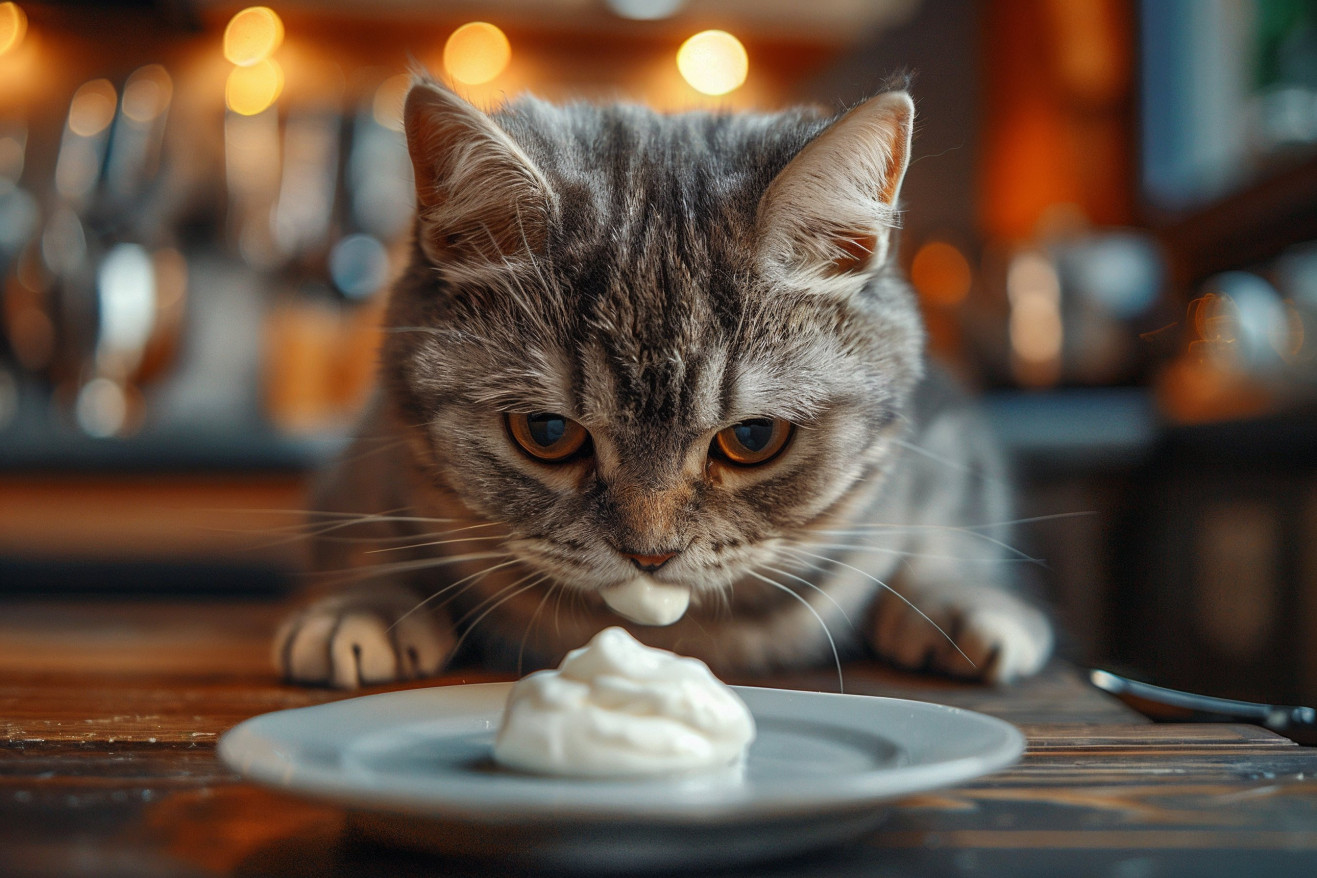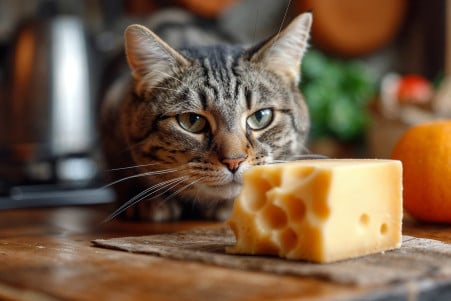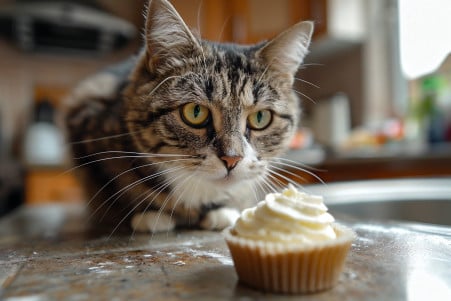Can Cats Eat Greek Yogurt? A Look at the Best and Worst Cat Treats
6 March 2024 • Updated 6 March 2024

Greek yogurt is a popular snack for humans, but can you share it with your cat? While cats can have a little plain Greek yogurt, it contains less lactose than other dairy products, which can be hard for some cats to digest. That said, many cats are lactose intolerant, so you should proceed with caution and monitor your cat for any signs of stomach upset. Make sure to choose a plain, unsweetened option.
We’ll cover the most recent research from veterinary nutritionists and animal nutrition experts to help you learn more about where Greek yogurt fits into your cat’s diet. This includes research on lactose intolerance in cats, the potential advantages of probiotics, and the nutritional needs of cats.
The hope is to give you a well-rounded view of whether Greek yogurt can be a nutritious addition to your cat’s diet or if it’s best to skip it.
Can cats eat Greek yogurt?
Why Are Cats Lactose Intolerant?
Lactose intolerance in cats is the result of a genetic mutation that causes lactase deficiency, meaning the cat’s body can’t produce the enzyme lactase, which is necessary to digest lactose, the sugar in milk and dairy products.
In most mammals, including cats, lactase production decreases after weaning, and the remaining lactase is eventually lost. This is why most adult mammals, including cats, are lactose intolerant.
Because Greek yogurt is fermented, it has less lactose than other dairy products, and therefore, it may be easier for some cats to digest. However, lactose intolerance is still common in cats.
Zoetis Petcare says that cats are attracted to dairy products because of their fat and protein content, even though they can cause lactose-induced gastrointestinal issues.
If you’re thinking about giving your cat Greek yogurt, you should feed them a small amount and then watch for a reaction for 18–24 hours. VCA Animal Hospitals lists signs of lactose intolerance, which include diarrhea and abdominal pain. If your cat is lactose intolerant, Zoetis Petcare says that lactose-free milk or water with a small amount of low-sodium chicken broth can be given as a treat. Always talk to your vet before adding anything to your cat’s diet.
Greek Yogurt and Your Cat’s Diet
Cats need to eat a diet that meets their specific nutritional needs. According to UK Pet Food, cats require 41 different nutrients, including high levels of protein, specific amino acids like taurine and arginine, and vitamins like niacin and Vitamin A—many of which they can’t produce on their own. While Greek yogurt can help boost protein intake, it doesn’t provide the amino acids and other nutrients that cats need to be healthy.
While Greek yogurt can provide probiotics, which are important for gut health, the potential benefits need to be weighed against the potential risks. The Purina Institute warns that a well-balanced diet is important to prevent obesity-related health problems in cats. Because Greek yogurt is high in calories, it can lead to overconsumption if it’s not carefully managed by cat owners.
When it comes to using Greek yogurt as a treat, it’s important to make sure that it doesn’t replace the essential nutrients in a cat’s regular diet. As an occasional treat, in small amounts, Greek yogurt can be a safe way to spoil some cats.
However, cat owners need to be careful about portion control to avoid obesity and make sure that their pets are getting most of their nutrition from specially formulated cat food that meets all of their dietary needs.
Probiotics in Feline Health: Can Cats Eat Greek Yogurt?
Probiotics are live microorganisms that, when administered in adequate amounts, confer a health benefit on the host. These microorganisms are important for maintaining digestive health, supporting the immune system, and protecting the body from harmful bacteria. In people, they can help with a variety of digestive issues, including those caused by antibiotics or lactose intolerance. But can they help cats, too?
Because cats have a different digestive system and different nutritional needs than people, the way they respond to probiotics can be different. One study in the Journal of Veterinary Internal Medicine found that probiotics, specifically Enterococcus faecium SF68, improved fecal consistency and reduced the number of episodes of diarrhea in shelter cats.
Meanwhile, a specific multistrain probiotic has been shown to improve gut health in cats by increasing the levels of good bacteria and decreasing inflammation, according to a study in Metabolites.
Greek yogurt contains probiotics, but it’s unclear whether the strains of bacteria in Greek yogurt and the overall makeup of the food are beneficial for cats. In addition, because cats can be lactose intolerant, Greek yogurt may not be the best way to administer probiotics to cats. Instead, cat owners should consider probiotic supplements that are specifically formulated for cats, which can offer the same benefits without the potential for lactose-related problems.
Cat owners who want to give their cats probiotics to improve their gut health should make sure to choose products that are formulated for cats. As always, it’s important to talk to your vet before making any changes to your cat’s diet to make sure you’re doing what’s best for your furry friend.
How to Add Greek Yogurt to Your Cat’s Diet
You should add Greek yogurt to your cat’s diet carefully to avoid any digestive problems. Start with a small amount, no more than a teaspoon, and watch your cat for the next 24 hours.
It is recommended by Zoetis Petcare that you watch for signs of lactose intolerance, such as diarrhea or vomiting. If there are no issues, you can slowly increase the amount, but you should not go over three to five tablespoons a week, according to Wag Walking.
To make sure that treats like Greek yogurt stay treats, they should not make up more than 10% of your cat’s daily caloric intake. The Pet Nutrition Alliance offers a cat calorie calculator to help you make sure that you are giving your cat the right amount of treats based on their diet. Always make sure to pick plain, unsweetened Greek yogurt to avoid any harmful additives like xylitol.
Make sure to talk to your vet before making any changes to your cat’s diet, especially if your cat has any pre-existing health problems. If you notice any discomfort or allergic reactions in your cat, stop giving them Greek yogurt and talk to your vet. A healthy diet is important for your cat’s health, and if you follow these guidelines, Greek yogurt can be a safe and fun treat for your cat.
Final Thoughts: Can Cats Have Greek Yogurt?
So, what’s the final word on Greek yogurt for cats? In our investigation into whether or not Greek yogurt is a good option for cats, we’ve found a few things to keep in mind.
While Greek yogurt has less lactose than other dairy products, there’s still a risk of lactose intolerance in cats, which can lead to digestive upset like diarrhea and vomiting. On the other hand, Greek yogurt can also be a source of probiotics, although it’s important to note that probiotics may not be necessary for cats that don’t have digestive issues.
Veterinarians like Renee Schmid from Pet Poison Helpline and the experts cited by Rover, including the team at PetMD, all agree that Greek yogurt is okay for cats in moderation. They also agree that pet parents should watch for signs of lactose intolerance and make sure to feed their cats plain, unsweetened Greek yogurt to avoid the risks of toxic additives.
So, while cats don’t need dairy treats like Greek yogurt, they can be a nice occasional treat for some cats.
In the end, Greek yogurt can be a good option for cats that don’t have a problem with lactose intolerance, but it should never be used as a replacement for a nutritionally complete diet.
As always, it’s best to talk to your vet before adding any new foods to your cat’s diet to make sure you’re doing what’s best for your furry friend. This will help ensure that our cats are healthy and happy and that their culinary explorations are both safe and fun.


